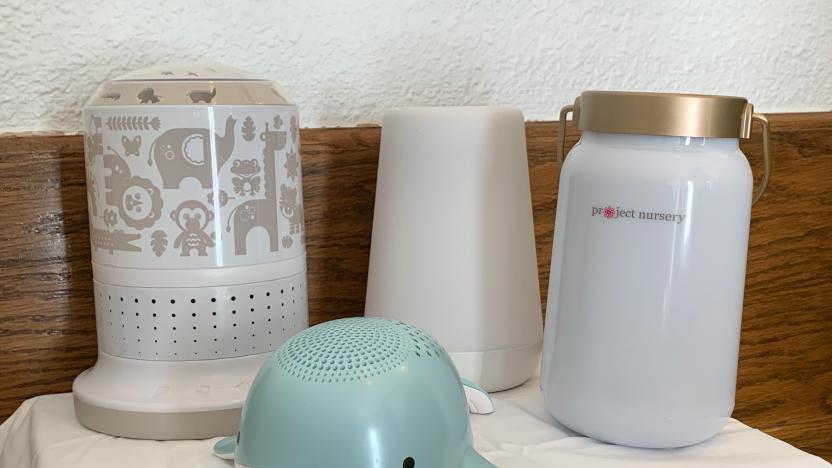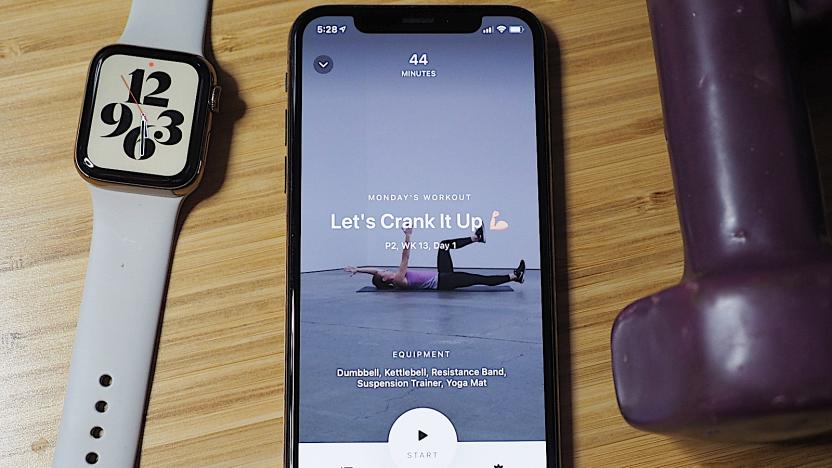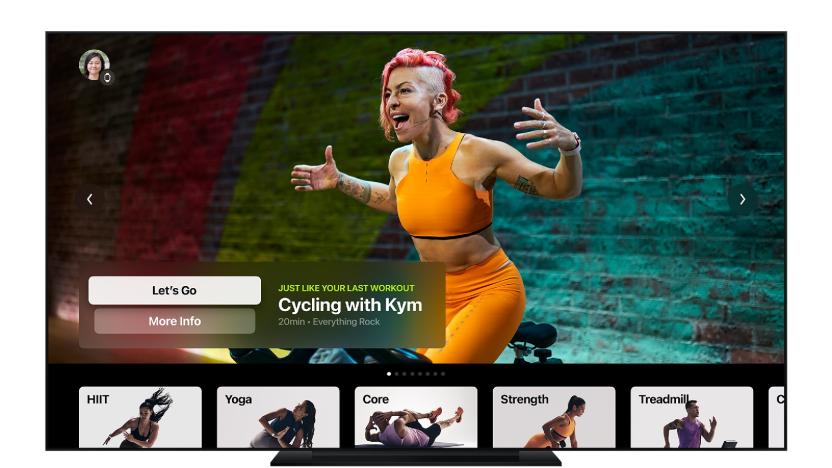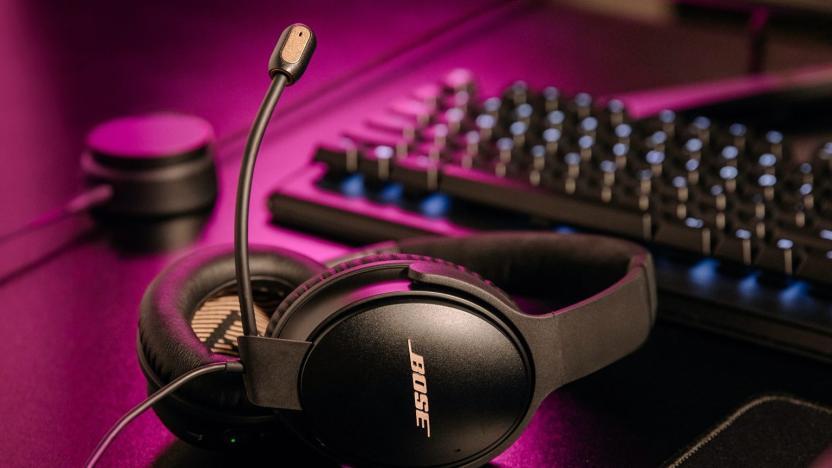Lifestyle
Latest

Mila hands-on: Much smarter (and pricier) than your average air purifier
The $360 Mila is a lot smarter than most air purifiers, giving you a ton of customization and personalization options.

The best white noise machines for babies
Engadget editors test out four smart white noise machines intended for the nursery.

Owlet Dream Lab review: Can a sleep coaching program help my kids?
Here's Engadget's review of Dream Lab by Owlet, a sleep training program that promises to help your child sleep better.

A personal trainer app guilt-tripped me into exercising (and it worked)
Read Engadget's review of the personal training app Future Fit.

Hatch Grow review: A smart scale for infants that could have been great
Hatch's Grow smart scale has terrific potential, but just isn't there yet.

Two weeks with Apple Fitness+
We spent two weeks with Apple's new Fitness+ service.

Bose turns its beloved QC 35 II headphones into a gaming headset
Bose's first gaming headset is a new take on the QuietComfort 35 II.

Netflix gave Gwyneth Paltrow money to make a 'Goop' series
Whatever you think about the authenticity of Goop's health offerings, you're about to see a lot more of them online. Gwyneth Paltrow's outfit is launching a documentary series on Netflix that will examine "physical and spiritual wellness" issues. Goop wants to tell "bigger stories" that need a TV budget, content chief Elise Loehnen told Variety. Paltrow, Loehnen and Goop editors will host the string of 30-minute episodes when they premiere in the fall.

Beautifully chronicle and share your life with StoryPress
On the surface, StoryPress looks like any other photo journal app, but its unique mix of audio, visual and written storytelling is far more captivating. The oral traditions of storytelling are a lost art. These days, we tell all of our stories on social media, pictures and texts. While I'd rather converse on Twitter than anywhere else, something is always lost in translation when you can't hear someone's intonation. You miss out on some of the "heart" of the story. That's where StoryPress comes in. It blends the best of both worlds. It captures the spirit of oral storytelling and puts it in a digital package. Available for the iPad, iPhone and also on the web, the app lets you share every aspect of your life, not just what's happening right now. Reflect on your childhood or college years. Chronicle parenthood, travels or holidays. Recount milestones and funny moments. Use the app as a diary, so that you never forget those small, but important, moments. To help you tell your stories, there are templates called story guides. Each story guide prompts you with a different set of questions. Every question represents a chapter in your story. Some of these questions can get pretty personal. The "living bio" template asks you about your relationships with your immediate and extended families. How close are you? Do you like each other? Are holidays fraught with fighting? Okay, it may not ask that last question, but you get the idea. There are also questions about your spiritual beliefs and personal philosophies. This might seem like a turn off, but it's the point of the app. It wants to create a full picture of who you are and how you've lived your life. If you're using it to catalog deeply personal events, StoryPress gives you new way to get introspective and reflect on your life. You don't have to get personal. Record significant or funny moments, like marathons, weddings or simple get-togethers. To get started, select a story guide topic. Tag each chapter with "who," "where" and "when." Then, upload a photo or video. Next, click the microphone button and start telling your tale. When you are done answering one question, swipe to the left to reveal the next one. You do not have to answer every question in a story guide. It's up to you how much information you want to share. If you don't find any of the guides relevant or helpful, you have the option to create a custom story. While you don't make typical status updates, StoryPress is a social media app. You follow people just as you do on any other network. However, there is a "private" option so that you don't have to share every story with your followers. If you did want to give a Twitter or Facebook-like update, you'd have to create a new chapter and record your status. Not everyone is going to like this app. Recording yourself telling a story can be awkward for a lot of people, myself included. Despite that fact, I really love StoryPress. By verbally telling your story, you add layers of context to key events and memories. If you want a fun, beautiful and unique way to chronicle your life, you need to give StoryPress a try.

Runico lets you create personal amulets for good fortune
Runico is a universal app that enables you to create customized amulets to bring good fortune. These can involve anything from love to career success to health. Depending on your beliefs, you might take comfort in knowing you have a personal amulet on your phone that will ensure a better future. The app offers various amulets and design styles, plus the ability to paste it on an image or wallpaper so it's always visible to you. Runico is free with in-app purchases and requires iOS 7.0 or later. To get started creating an amulet to help with your life goals, tap the Plus icon at the bottom and choose a category. Runico comes with amulets for love, success, protection, career and health. Tapping "Your Own Formula" lets you create your very own amulet as well, dragging and dropping runes - each with their own meaning - to form a unified symbol that suits your needs. Pre-made amulets come with a name and description. For instance, I picked out the Inspiration amulet, which according to Runico "stimulates inspiration and a flow of creative ideas" and "will prove helpful to the people whose work requires creativity." Unfortunately, a lot of the amulets available in the app require an in-app purchase. Only a select few in each category are free and the rest have locks on them, selling for US$0.99 to unlock. Additionally, to create an amulet entirely from scratch, it sets you back $2.99 - a tad pricey for a personal symbol likely to only make an appearance on your iOS device's display. When you do find an amulet you like, whether free or paid, you have an option to paste it on a new photo, a photo already in your camera roll, a photo from a social network, or one of the app's unique wallpapers. The latter entails yet another fee: $0.99 to buy the entire wallpaper pack. Runico does provide a number of decent styles for your amulet to overlay onto an image, like metallic, glass and wooden backgrounds - or just plain works, too. Fortunately none of these cost more money. Fill in a description for your amulet if you'd like or elect to set it as for an event so that it only lasts for the duration of that event. When you create the amulet, there's no going back. The Edit button only works to change the description or event. The image and amulet design are permanent. Though the library of different amulets is extensive and the design on photos are adequately elegant, the fact that Runico limits so much content in the app by in-app purchases is frustrating. In-app purchases should be implemented in a way that they enhance the app and enable more possibilities, but here they just feel like walls locking you out from the app's full potential unless you pay up. If you're willing to overlook the large amount of in-app purchases, solely as an amulet creator the app does work very well. The amulets are tasteful, easy to create and there's plenty to choose from. If you want a little spark of good luck in your life, give Runico a try in the App Store.

Qwingle is a calendar app built for families and teens
Qwingle, which requires iOS 7 and is available on the iPhone, iPad and iPod Touch, is a family focused calendar app that might be just the thing you need to manage back to school schedules. First off, this app is designed to be basic, fun and visually appealing. Its main focus is tracking social events. Think of Qwingle like one of those family planning wall calendars with cute stickers and brightly colored labels. If you are a visual person, like me, you'll appreciate the color-coded categories and icons, as a lot of calendars don't have this. There's an option to filter events by category, as well. As far as contact management goes, you can sort your contacts into groups. There are suggested group names, but it's possible to edit them based on your needs. The default groups will clue you in on the type of person who would get the most out of Qwingle. There are some interesting social features. There's a status update option, similar to standard social networks. You can share these updates, as well as events, on Facebook, Twitter and Google+. People in a group can comment and like an event or status within Qwingle. All of this combined with the option to upload photos to events and status updates, makes the app function like a social diary. If you want an event to be visible to only yourself or a specific group, set it to private. Only those invited will see it. A few other things to note: When you add an event location, Qwingle links you to directions and a weather forecast. Plus, there are special offers for nearby restaurants, theaters, accommodations and other attractions. A big drawback here is that your contacts must also use the app. Because of this, only a very specific subset of people will use it. There will be a lot of individuals who won't want to bother with another calendar. That being said, Qwingle is great for busy families who need to stay in touch and keep track of each other's schedules. Since it's back to school season, managing everyone's time while you get back into the groove of things is a juggling act. The social features allow you to communicate with your kids when you change your schedule. Likewise, they can let you know their afterschool plans. Sure you can text, but it's nice having schedules and related conversations all in one place. Even if you have another calendar app like Tempo to keep track of your professional life, adding a family focused calendar to your productivity arsenal might be useful in maintaining your sanity. The app will also appeal to teens and college age kids who want organize and share their plans with a select group of friends. Qwingle can become something of an exclusive inner circle secret. The social sharing aspect is an added bonus. For the average person, Qwingle doesn't give you any reason to use it. But that's okay. It's not built for everyone. It's for a very specific demographic. Yet, even within the sphere of family centric calendars, Qwingle's social features likely aren't enough to make it more attractive than other options, like Cozi. Still, Qwingle is free, so it's worth the test drive, especially during the back to school rush.

Breakdown Buddy: How does it break down
Breakdown Buddy (US$0.99) is a useful app for organizing information needed in case of a car breakdown. The app works on all iOS devices running iOs 7.1 or later. There are two functions of the app; the ability to find your current location on a map and a section that holds details for a breakdown, including the number of a tow truck, car registration, your telephone number, insurance policy number, and a notes section. Having all of that on your phone helpful in stressful situations. It would be even more useful if you could tap on a number in the "breakdown telephone number" field to place a call. It seems a little awkward to have to exit the app to dial a number its storing. The location finder is a basic map that lists street names but not addresses. This is helpful in telling approximately where you are broken down at, but you could also just open up a maps application to find your location with even more accuracy. Breakdown Buddy has a very clean interface and this reinforces the goal of storing all of this important information in one easily accessible place. With some tuning of each feature, this app would definitely be a great help if you find yourself stuck on the side of the road with a broken down car. Breakdown Buddy is US$0.99 on the App Store. It needs a couple of changes to be worth the money as you get more benefit currently from saving your breakdown information in a note taking app and a maps app when used together.

The Soapbox: Gaming addiction isn't about games
When I was 21, I was miserable. I was stuck in a long-distance relationship with someone I couldn't trust and could barely see, I was stuck with no real career opportunities, and I had my entire lifestyle ripped away from me unexpectedly. I felt like I was willing to climb, but I didn't see any handholds out of the pit I was stuck in. The only thing I looked forward to was the end of the day, when I could crawl into a game and let my actual day-to-day life evaporate into memory. I wasn't an addict. Barely. This isn't a plea for sympathy; all of this happened years ago, and it's not where I am now. Things got better. This is a talk that we need to have about addiction because the few times that addiction gets brought up, it's addressed by people who seem to have only the vaguest grasp of the games involved. Addiction isn't a result of game mechanics or playstyles or subscription formats or anything else. It's a result of people.

This is Your Life: Facebook and the business of identity
"The story of your life." With that phrase, Facebook CEO Mark Zuckerberg introduced the company's new Timeline profile in the fall of 2011. The social network's original profile page, he explained, was the first place where most people "felt safe expressing their real self" on the internet, but it was only the "first five minutes of your conversation." A major redesign in 2008 extended that to "the next 15 minutes." Timeline, though, was the "next few hours." Your true self, in full. To illustrate the point, Zuckerberg went on to show a promotional video that put This Is Your Life to shame by recapping one man's life from his own birth to the birth of his child (and then some) in just over a minute. Facebook has always wanted to be your online identity -- your internet, in many ways -- but it was now also bringing something else to the fore that once had a tendency to fade into the background; your memories.

The price of independence: What it really costs to be an indie developer
Will Stallwood is a gambler. He's had the same addiction for years, yet he's never stepped foot inside a casino.He's never found himself hunched over a table fitted with worn green felt, sliding his last two chips between sweaty, shaking palms. He's never felt the sick dread as a slot machine whirs through its final frame; he doesn't know if he prefers red or black. Stallwood has been addicted to gambling on the success of his indie studio, Cipher Prime, since its triumphant launch of Auditorium in 2008. But this year feels different. This year Stallwood feels as if his lucky streak may finally be running out.Cipher Prime isn't an unknown team of novice developers working out of a garage, but that doesn't mean they're rolling in dough either. Its previous titles were successful, but after a deal went raw with Fractal's publisher, Zoo Games, Cipher Prime was stuck with a rushed title and more debt than it ever expected.Stallwood and Cipher Prime co-founder Dain Saint had to legally fight for the rights to their own game, eventually getting them back more than 200 days after Fractal launched on the App Store. Saint and Stallwood were understandably turned off of the old-school publishing route."We were not a fan of the publisher model before, because it just covers development and we never see royalties no matter how good the game goes," Stallwood said. "Now, we're just completely sour to the whole thing. We're not completely opposed if it means the difference between making games or not, but if there is any way we can avoid it and still make games, we're certainly going to try."Cipher Prime has found another way -- it hopes -- with Kickstarter.%Gallery-148865%

Ol' Grumpy and the Dragon Soul nerf
OK, I've had a day to think about the recent announcements regarding the Dragon Soul raid and the progressive nerfs that will be rolling out at the end of January. My thoughts on it have evolved from my initial confusion and even disbelief. I freely admit, when I first read that Blizzard was introducing an ICC-modeled debuff to the raid, I was incredulous. I didn't see why it was necessary, and I said as much. Several of you then upbraided me on Twitter, and frankly, you gave me things to think about that I hadn't considered. This dovetailed with recent statistics posted on MMO-Champion about who'd completed Dragon Soul in the Raid Finder vs. normal mode. This led me, inexorably, to the following conclusions: The Raid Finder is head and shoulders above normal mode raiding in terms of popularity. 35% of level 85 players have completed Raid Finder vs. 4% completing normal mode; that's a huge, huge shift. Keep in mind that Blizzard has more exacting statistics available internally, but this serves as an indicator of a trend. Fewer than 200,000 players have finished normal mode Dragon Soul. I'll admit, I found this shocking. With the exception of Ultraxion and Madness, I found Dragon Soul to be undertuned and figured many more players would have completed the raid than this. One commenter on Twitter even blasted me for my elitism, when I had been under the impression I'm a fairly middle-of-the-road raider. These numbers bear that out. Over 1 million players have finished Dragon Soul in the Raid Finder. Both this statistic and the preceding one are as of the end of December 2011. But how ever they've changed and how ever the more precise Blizzard statistics play out, this is still a very strong indicator that normal mode Dragon Soul isn't the cakewalk some of us thought it was, myself included to some extent. Almost 800,000 players finished normal Firelands, and the majority of them did so after the nerf to Firelands. I think this fairly well speaks for itself.

The Light and How to Swing It: Juggling Yor'sahj's oozes
Every week, WoW Insider brings you The Light and How to Swing It for holy, protection and retribution paladins. Every Sunday, Chase Christian invites you to discuss the finer side of the paladin class: the holy specialization. Feel free to email me with any questions you want answered, like why paladins are so awesome. While Ultraxion is definitely the most unique fight for healers in this tier, Yor'sahj the Unsleeping is a close second place. The boss' abilities are simple for the DPS classes and tanks, but healers will constantly be reacting to the summoned oozes and their various effects. These globules cause us to shift our healing strategies with each new wave, and learning to handle the globules will be the key to mastering this encounter. Every raid group is going to handle the ooze packs differently. You need to familiarize yourself with what each ooze can do, and then combine the effects based on your raid leader's preference. You'll be faced with three oozes at a time on Raid Finder and normal difficulties, with the option to kill one ooze out of each wave. On heroic difficulty, there are four oozes per wave, for a total of three effects on the boss after you've killed one of the oozes.

Jawbone's Up wristband warms up at AT&T store, wants you faster, stronger
Jawbone's fitness-obsessed wristband appears to be closing in on the retail finish line. The Up pairs with what appears to be an iOS app, (no news on whether an Android version is in the pipeline), and will pile on the guilt about your disgustingly sedentary lifestyle. You can have the luxury of feeling like a weight loss reality show contestant by scheduling "get up and move" reminders when you've succumbed to watching back-to-back mediocre sitcoms with a Doritos family bag chaser. There's also a sleep tracker and a challenge tab to plot your amazing weight loss journey (or descent to an early demise) against friends and family. It'll monitor what you eat, and even tell you which foods "help you feel your best." (We think it's cake.) No word on price or arrival date just yet, so you'll just have to put up with Autom until we hear more. [Thanks, Luke]

GDC Online 2011: BioWare's Damion Schubert takes a wrecking ball to the casual vs. hardcore model
"I'm trying to finish a product, Star Wars: The Old Republic, which I am not going to talk about today." Thus began BioWare's Damion Schubert's seminar, Double Coding: Making Online Games for Both the Casual and the Hardcore, at this year's GDC Online. "This is more of a weary man, sort of stream-of-consciousness design theory talk." Schubert wanted to call the talk "Moving Beyond Double Coding," which is a term that comes from cartoons, of all places. Double coding is content that reaches two different groups of people at the same time. Looney Tunes, for example, would entertain both adults and kids because the writers and animators designed it so. With MMOs, Schubert says that devs are often trying to double code the games for both casual and hardcore players. This is where the well-known slogan "easy to play, hard to master" originates. He held up Blizzard as a primary example of this model. Blizzard's "donut," as Schubert calls it, has a casual outer ring and a hardcore center for both types of players. By double coding, Blizzard ensures that casual players can invite their hardcore friends to experience the game and vice-versa. However, this model is faltering, and Schubert pinpoints why after the jump!

Acer unveils TravelMate 8481T laptop for the all-business crowd
Globetrotting financiers have a new companion to slot into their briefcases, now that Acer has taken the wraps off its TravelMate Timeline 8481T notebook. Powered by an Intel Core i5 processor and weighing in at 3.7 pounds, this little guy boasts a 14-inch, 1366 x 768 LCD that's been engineered to fit within a 13-inch footprint, thanks to a frameless, bezel-trimming design. The latest addition to the TravelMate 8481 family also boasts 4GB of DDR3 memory (or 8GB, if you upgrade) and a 320GB SATA hard drive, along with the usual collection of WiFi, Bluetooth and USB 3.0 capabilities -- all packed within a slim, 0.87-inch thick frame. The laptop is expected to start shipping in "early September" for $1,000, but you can find more details in the full PR that's sitting after the break.












